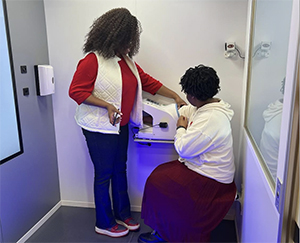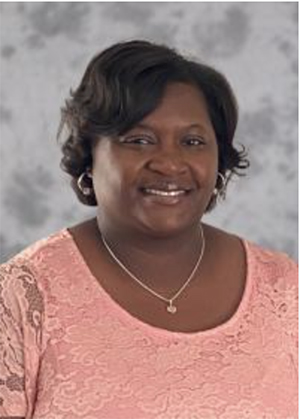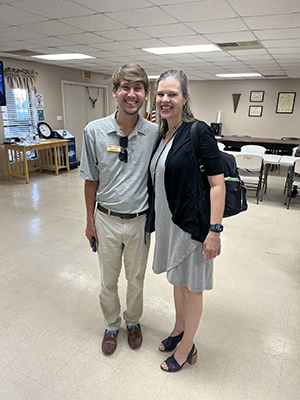West Alabama’s Health Pioneers: Local Champions Leading the Way
By: Mikailie Caulder

In the heart of West Alabama towns, where neighbors still check in on one another and word-of-mouth travels faster than the internet, a quiet revolution in health and wellness is taking shape. Stories of limited healthcare access, rising chronic illness, and everyday struggles of staying well in rural areas echo throughout the community. Rather than accepting these challenges, West Alabama community members have begun rolling up their sleeves to bring education, resources, and hope to their towns. This growing network of health advocates is proving that real change starts with people who care enough to make a difference.
Across the five communities supported by the Auburn University Rural Health Initiative, local champions are pioneering to improve health in their communities. Trenisha Mack, the County Extension Director of Sumter County, plays a pivotal role in bridging the gap between research-based information and local citizens. She has spearheaded efforts to improve healthcare access, expand health education, and promote healthier lifestyles. “Access to quality healthcare in Sumter County is limited, and this gap has a profound impact on the well-being of many residents. I’ve seen firsthand how this lack of care leads to preventable health issues that affect individuals and families,” Mack explains. Witnessing the challenges caused by limited healthcare access fuels her commitment to advocacy, striving to create “a community where improved healthcare access not only enhances individual lives but also strengthens and uplifts everyone.” One notable initiative Mack introduced to Sumter County is “Move Alabama”, a statewide physical activity program designed to help residents overcome barriers to exercise.

Dimetra Wiggins-Rollins of Hale County has dedicated her career to improving healthcare access for underserved communities. As a Licensed Practical Nurse (LPN) with 20 years of experience, Wiggins-Rollins helps people navigate the healthcare system, ensuring they receive proper care. Though she has worked across various healthcare settings, today she finds herself at the front line of health outreach, following up with patients on critical health issues. “I see the need every day – it’s my family, my friends, my church members,” she explains. Her experiences have fueled her passion and involvement with the Auburn University Rural Health Initiative. “People in rural areas, especially those with low incomes, are already up against so much. The idea of the CareStation being right there in the middle of the community was what inspired my husband and me to get involved.”

Another key player in these efforts is Hayden McDaniel, the Technology Coordinator for the Connecting Minority Communities (CMC) Grant Pilot Program, based in Sumter County. This partnership has been instrumental in providing essential internet access to rural communities, enabling the Auburn University Rural Health Initiative to expand its reach and impact. “As a rural Black Belt county, we face significant resource limitations,” McDaniel shares, “The [Rural Health] Initiative is making a tangible difference.” His role extends beyond that of making sure all the technology runs smoothly, he also facilitates digital skills training for seniors and promotes the OnMed CareStation’s benefits at community events. “Collaboration is essential for sustainability in rural communities,” he highlights. McDaniel also shared the success story of 84-year-old Bertha Pruitt, who received care for a burn injury via the CareStation instead of traveling a daunting 50 miles for medical attention. “It saved her a trip, and she was able to get the treatment she needed without the burden of travel.”
This wave of community-driven health advocacy in West Alabama demonstrates the power of local leadership in transforming healthcare access and education. Through the dedication of individuals like Trenisha Mack, Dimetra Wiggins-Rollins, and Hayden McDaniel, the Auburn University Rural Health Initiative is not only addressing immediate healthcare challenges but also building a foundation for long-term wellness in these rural communities. Their efforts show that meaningful change doesn’t always come from large institutions, it often starts with those who are willing to step up, advocate, and take action for the well-being of their neighbors. As these health pioneers continue to lead the way, they are proving that when communities come together, lasting and impactful progress is possible.
Last Updated: March 31, 2025
